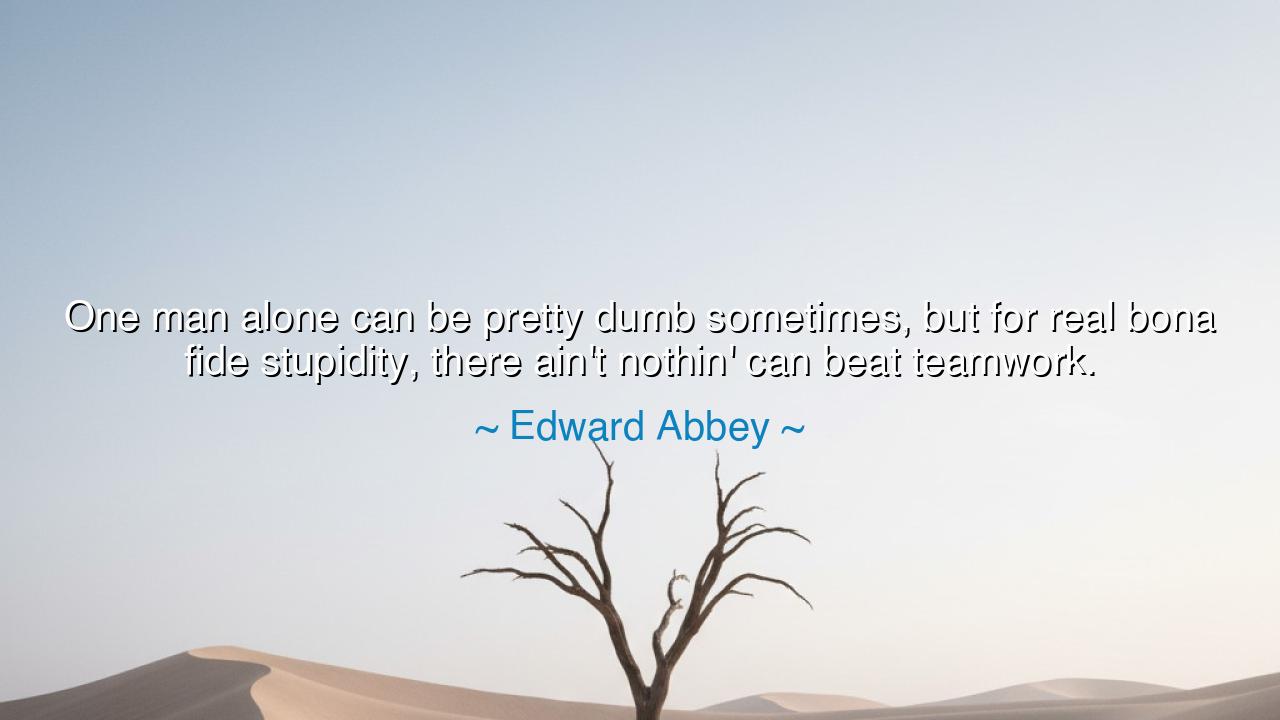
One man alone can be pretty dumb sometimes, but for real bona
One man alone can be pretty dumb sometimes, but for real bona fide stupidity, there ain't nothin' can beat teamwork.






In the grand theater of life, where the actors play their parts and the audience watches the unfolding drama of human endeavor, there is an undeniable truth, spoken with wit and wisdom by Edward Abbey: “One man alone can be pretty dumb sometimes, but for real bona fide stupidity, there ain't nothin' can beat teamwork.” These words, though drenched in humor, contain a deeper message about the nature of collaboration, the power of unity, and the potential dangers of collective action when it is not guided by wisdom or clear purpose. Abbey’s quip reminds us that while one person may falter alone, the folly of a group, if unchecked, can lead to greater consequences.
The ancients were no strangers to the idea that individuality and collective action could be both powerful and dangerous. Consider the Athenians, whose democracy was celebrated for giving power to the people. Yet, at times, the collective decisions of the Athenian Assembly led them to actions that were less than wise. The Peloponnesian War, for example, was driven by a series of misguided collective decisions. The Athenians, despite their individual brilliance, succumbed to the foolishness of their unity, dragging their city into a ruinous conflict. This historical lesson shows us that while individuals may act recklessly, the stupidity of the crowd can be far more devastating, as a group lacks the critical thinking that an individual might bring to a situation.
In Shakespeare’s tragedies, we see similar themes at play. Julius Caesar, though a man of great vision, was ultimately undone by the collective ambitions of his assassins. Each conspirator, believing they were acting in the best interest of Rome, contributed to one of history’s greatest acts of betrayal and political chaos. Here, teamwork—though motivated by noble ideals—became a breeding ground for tragic misjudgment. Abbey's humor mirrors the wisdom found in these ancient lessons: when the minds of many are driven by unexamined motives and blind conviction, the result can be a calamity far greater than any individual could bring about.
In modern history, the lesson of collective folly is evident in the disastrous decisions made during the Great Leap Forward in China. The communist leadership, guided by the collective vision of an entire government, pursued policies that led to a catastrophic famine that claimed the lives of millions. The individual voices of caution were drowned out by the collective will of the state, and the stupidity of teamwork resulted in one of the greatest humanitarian crises of the 20th century. Abbey’s words echo through history, reminding us that while a single individual might make a poor decision, it is the collective folly of many that can lead to unimaginable consequences.
However, Abbey’s quote also speaks to the strength of individual thought. While teamwork can indeed lead to misguided efforts, the individual who retains their independence and clarity of mind has the potential to guide others toward wisdom. Consider Martin Luther King Jr., whose solitary courage and commitment to nonviolent protest sparked a movement that changed the course of history. His vision, though rooted in his personal experience and understanding, inspired countless others to follow his path. King’s leadership reminds us that while collective efforts are necessary to bring about change, it is the individual who often provides the clarity and direction in times of uncertainty.
The lesson of Abbey’s words is clear: individuality and teamwork are not inherently good or bad, but they require careful balance. Collective action can create great change, but it must be tempered by the wisdom of the individual. It is in solitude, in moments of self-reflection, that we gain the clarity to guide the crowd and ensure that collective actions are aligned with wisdom and integrity. Abbey’s humor serves as a reminder that we must always approach collaboration with thoughtfulness, ensuring that the collective does not drown out the voice of reason that lies within each individual.
Let us take action: In our own lives, let us recognize the power of individual thought while embracing the benefits of collaboration. When we work in teams, let us encourage open dialogue and ensure that every voice, particularly those that offer caution and wisdom, is heard. Balance is key—individuals must lead with clarity, and the collective must move forward with purpose. In moments of shared action, we must remember that the wisdom of the individual will guide the strength of the group, ensuring that together, we do not fall victim to the follies of misguided teamwork. Through this, we will find the strength to make decisions that uplift us all, rather than leading us into ruin.






AAdministratorAdministrator
Welcome, honored guests. Please leave a comment, we will respond soon